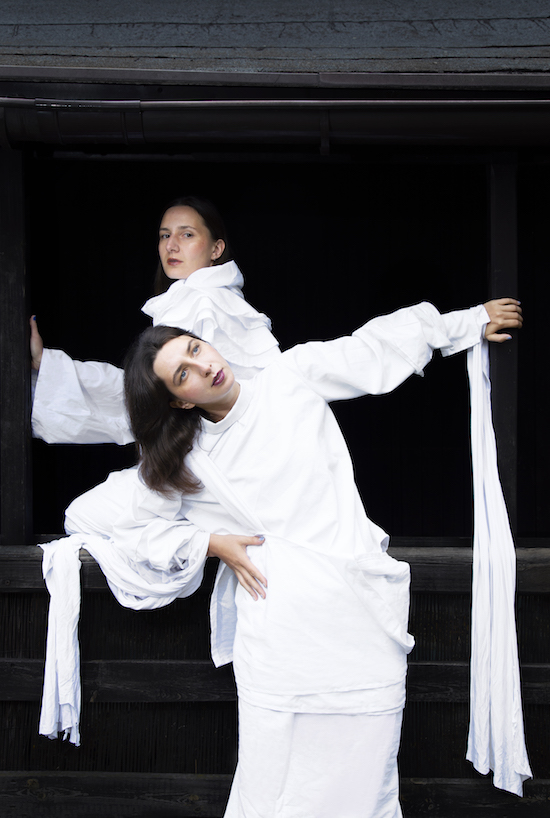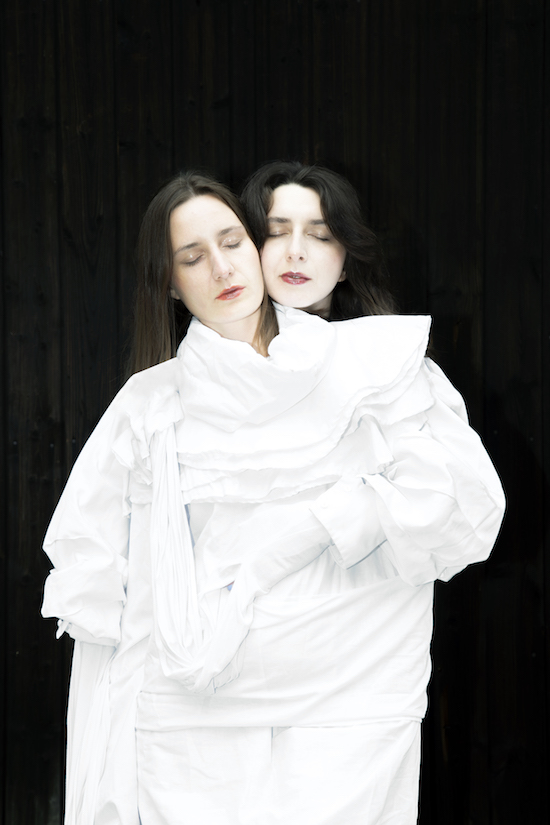Portraits by Marcelina_Pieniążek
Amongst the beautiful and uncanny spoils of this year’s Supernormal are WIDT, a pair of women who encompass duality. An audiovisual collaboration that tightly weaves together the weird and intricate vocal loops and soundscapes of Antonina Nowacka with the similarly strange and enticing visuals of
Bogumiła Piotrowska.
Both of the Warsaw native duo would be hindered by the absence of the other. A group built on an innate bond, they’re more than just a pair like minded artists, they’re sisters and had been pursuing creative endeavours in tangent long before WIDT. Pursuing both abstract and the uniform performance as children.
Their music now is wholly singular and exciting. Somehow both pervasive and pretty at the same time, it compounds all the aesthetics and feelings that hi-tech futurist music that the turn of the decade has promised us. Processed and arpeggiated but nonetheless containing humanistic voices on top of synthesised noise which of (sometimes grubby, sometimes scrubbed clean) industrial textures. Their work is palpable and at moments fragile in spite of its grandeur – revealing vocal cracks and breaks in sound. These sounds are also mirrored in the visuals – which
match them with an almost eerie ease.
The psychic is quintessential to their experience. Producing shows that are immersive and dream like. WIDT are one of those ‘you’ve got to see them for real’ artists. The last 12 months have been huge for the pair, the news has arrived that they are working with drum & bass legend Christoph de Babalon
at this year’s Unsound, as well as launching their philosophical and more stripped back concept project Mentos Gulgendo.
Their work is set to carry on at supernormal this weekend, working with a Cafe OTO choir delegation. We caught up with them to talk about Physicality, viscerality, and sisterhood.
<iframe
style="border: 0; width: 100%; height: 42px;" src="https://bandcamp.com/EmbeddedPlayer/album=1762895927/size=small/bgcol=ffffff/linkcol=0687f5/transparent=true/"
seamless>WIDT by WIDT
How important is your relationship as sisters when creating the music, performance and visuals
Antonina Nowacka: It’s interesting. For me it is a matter of trust – the awareness of being supported in the absurdity and bizarreness of what I do. I know many would send me to the ‘madhouse’ but, Mila understands it totally. In a relationship like this you can only blossom. Besides we’ve always spent a lot of time together, creating a kind of bizarre language of our own world.
Bogumiła Piotrowska: When we were younger, aged between eight and eleven, we used to create things together. We lived in a small flat with our mother and other sister and we grew up in one room. We did these kind of “poetic acts”, as Jodorowsky would call it. For example, we would march randomly around the flat colliding with each other from time to time and scream, but It had to be done in a very precise way. That lasted for a really long time. We also recorded very bizarre talks and acts on cassettes. Later we looked back on that. I found it to be really successful because it gave me satisfaction and fun it also had an impact on other people in the flat. They were disoriented and more chilled out once we’d finished. So I think that now we are co-working in order to achieve these kind of states.
I know the visuals and music are tightly connected and in fact actually affect each other in your work. Could you talk me through how that works?
AN: I must say it is a mystery to me and I like it. Many people think we are connected with cables during the acts but its funny how nobody realises there just are some connections in the world that people cannot see, but they do exist. I think we must use some of Bebza and Gorgondzina connectors – very unique products [LAUGHS].
BP: We work with the power of sound, amplification and light so, when we really get closer to what happens with the instruments and machines on a stage, we can see these little vibrations which are very quiet and delicate. The old electronic machines don’t need any sensors to interpret data – they are sensors. We, as humans, are as well. So we practice that telepathic communication doing things with each other. The thing we really care about is the narration. Telling the right story.
I Loved your collaboration with Christoph de Babalon, how did that come about?
BP: Yes, we love it too. We met in Berlin in 2016 playing together an improvisation at the Easterndaze x Berlin festival in the amazing silent green Kulturquartier. Back then we knew we would meet again. For us this is something special, the time we are spending together, how the progression of our perception and interaction of the thoughts emerges into reality. We talked about art, about music and what we think about what we see and what we listen to, also about taxes and work. It comes out that we agree in many fields also in many fields we probably disagree. Currently we are working on new material.
<iframe
width="550" height="315" src="https://www.youtube.com/embed/0d7Mf4B13yg" frameborder="0" allow="accelerometer; autoplay; encrypted-media; gyroscope; picture-in-picture" allowfullscreen>
Do you have more collaborations in the pipeline?
AN: Last year we did a short residency and performance with Francesco Cavaliere. He is my absolute favourite, and his creations are out of this world. I hope to work with him more in the future. Currently – we are now performing with small choirs, usually some people who never made music in their lives or played an instrument, but never sang. We like to work with non-professionals (like us), they are less pretentious and not afraid to do something people consider ‘wrong’.
Your shows seem really visceral in visual sense. How do you achieve this?
BP: By putting out our viscera. The light is in the form of the arc and it comes through little holes to be seen in our world. It comes from the other dimension. We, as humans, talk and write and record our reality in a way we know. But sometimes we do more about it – we describe the world not knowing How, using What we decide to use. And we transform the reality sometimes showing it visceral.
How much do you value physicality when it comes to creation?
AN: I am very physical, in a way my bones are hard and strong like a stone. I like to climb the mountains. I think physical and mental must coexist, one cannot be without the other.
BP: I find body, which is a form of existence, so exciting, absolutely beautiful and also undiscovered. I have muscles and can hold a big baby on my arms and when I am performing I feel like a glimmer. I value physicality as much as other components of the reality surrounding us and things created. And I believe that what is not saved as a physical object but happens – it is saved in physical bodies then and we do not necessarily realize that. During the performance all happens on the stage, and this presence is constituted by physicality. I can imagine that we have no bodies and there are no machines – but I have to imagine it.

Could you tell me a bit more about your project Mentos Gulgendo?
BP: It’s a musical duo. There is no video and image processing. We have got new material recorded and would be happy to release it.
AN: Mentos Gulgendo is an imaginary philosopher who we invented to objectify our absurd thoughts. Then he became our booker, because every serious band needs to have one. Finally, we started playing music for the organ together and we decided Mentos Gulgendo was a perfect new band. Maybe in the future it will materialise in another new form or idea.


